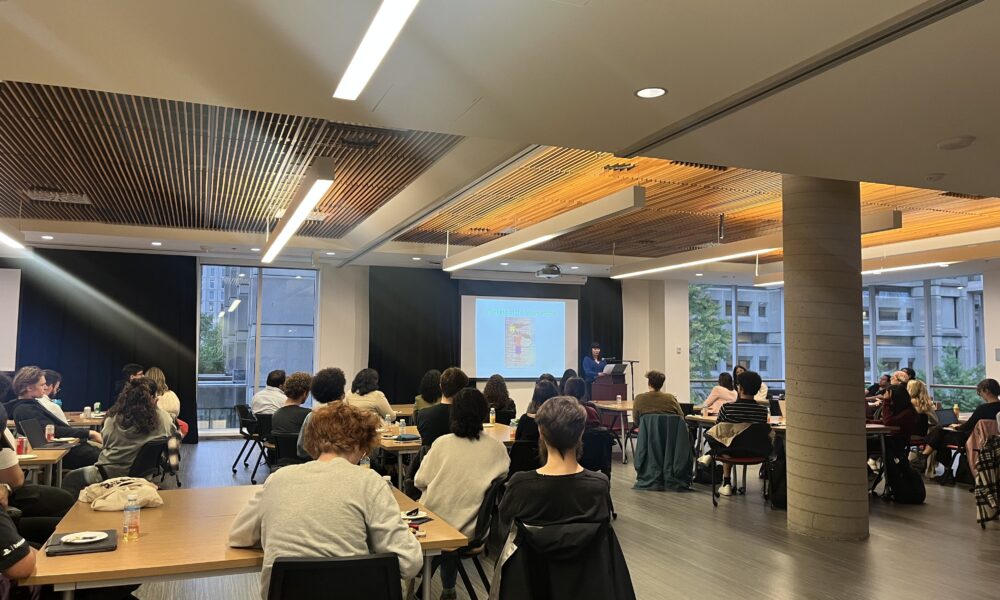McGill staff and students convened at Donald E. Armstrong Building on Sept. 25 for a talk presented by Candace Brunette-Debassige, assistant professor and Director of Indigenous Education at Western University. Her talk, entitled “Indigenous Women’s Leadership in Canadian Universities,” was organized by McGill’s Office of Indigenous Initiatives (OII) as part of the university’s Indigenous Awareness Weeks, taking place between Sept.19 and Oct. 2.
Organizers from the OII opened the event with a land acknowledgement and by inviting Robert Spade, assistant professor at the Schulich School of Music, to sing before introducing Brunette-Debassige.
Over the course of her talk, Brunette-Debassige discussed her research, which implemented an Indigenous story methodology to better understand Indigenous women’s experiences in leadership roles across Canadian universities between 2015 and 2020. Brunette-Debassige compiled qualitative data from 12 Indigenous women’s experiences in administrative university roles, including those of Brunette-Debassige herself, who is a Mushkego Cree iskwew of Peetabeck First Nation (Treaty 9). She found that although Indigenous representation in leadership roles at Canadian universities has been on the rise since the Truth and Reconciliation Commission issued its final report in 2015, Indigenous people remain underrepresented in these roles and face unique challenges when hired for them.
Borrowing from scholar Tanya Fitzgerald, Brunette-Debassige explained that Indigenous women are caught in a ‘triple bind,’ facing patriarchy, racism, and settler-colonialism. She invoked the teachings of Wisakedjak, the Trickster, to explain how Indigenous women found themselves in “paradoxical, in-between spaces.”
“Trickiness emerged in […] the difference in the divide between policy and practice, between rhetoric and reality,” Brunette-Debassige said. “It emerged in how women were simultaneously placed as being a symbol of the solution, but also being told they were the source of the problem, how they were tokenized and hypervisibilized. It even came through in them being both resistant [to] and at the same time complicit in the university.”
Brunette-Debassige also highlighted that Indigenous women are put in an impossible position when given the responsibility of addressing settler-colonialism at universities that perpetuate it.
“The contemporary university continues to be deeply complicit in ongoing settler colonialism, […] contributing to the othering and erasing [of] Indigenous peoples, our rights, our knowledges and education, through the ongoing privileging of Western knowledges,” she said.
Brunette-Debassige ended her talk by calling not only for greater Indigenous representation in universities’ leadership, but for better practices that look at systemic issues of settler-colonialism within universities. She also spoke to the need for more research on Indigenous leaders’ experiences at universities, and fielded a number of questions from the audience.
Spade invited students from his Ojibwe Song and Drum class to sing alongside him at the close of the event.
Najib Fenaoui, one of the students who performed, told The Tribune after the talk that Brunette-Debassige led him to reflect on his own experiences with intersectionality.
“I’m not Indigenous, but I can identify moments in my life where I felt in-between. You know, too different, whether it’s [because of] culture or sexuality or gender,” Fenaoui said. “It can be a really uncomfortable place to be in, especially if it’s not acknowledged.”
Annelies Koch-Schulte, U3 Arts and Science, explained that the lecture drove her to consider McGill’s complicity in settler-colonialism. Koch-Schulte acknowledged the importance of talks such as the one given by Brunette-Debassige and urged McGill to confront the ways it continues to perpetuate colonial ideologies, citing their legal battle against the Mohawk Mothers as an example.
“[McGill] needs to decide to have a turning point,” Koch-Schulte said. “Whether that occurs because [of] a change in who’s working in the administration, or whether it’s a change of heart, I think that that change can come at any point if [the university is] open to it.”
During the question-and answer-period of the lecture, Brunette-Debassige underlined the need for structural change at universities.
“Leadership is very individual and it’s not looking at the larger system,” Brunette-Debassige said. “The answer is not only leadership, it’s governance.”







